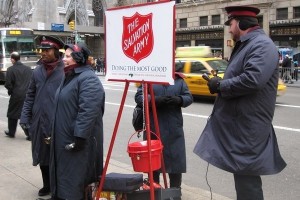Already the object of criticism in recent years for some of its doctrinal positions and policies, the Salvation Army just featured guest speaker Dinesh D’Souza, the man responsible for the anti-Obama propaganda book, The Roots of Obama’s Rage, and film, Obama’s America, at a big annual fundraiser. By choosing D’Souza the Salvation Army organizers, whether consciously or not, seem to be picking a side. I already had issues with D’Souza’s tactics before the book, as I explained here, and for an organization as broad as the Salvation Army to highlight such a rabid anti-Obama figure seems either tone-deaf or defiant. The crowd of 500 in Houston, who had donated $425,000 altogether to attend the luncheon, gave D’Souza a standing ovation.
This action suggests the Salvation Army doesn’t care about relations with anyone left of the center-right. They can raise a lot of money holding big fundraisers with the usual big-ticket red-meat conservative speakers like D’Souza and Ann Coulter. The problem, though, is they are a global organization with over a million members, and the second largest charity in the United States, receiving over $2 billion in private donations a year; and they’re on every street corner asking for money from the general public.
A fixture of the holiday season my whole life has been the Salvation Army Santa or “officer” with his clanging bell and red donation kettle hanging on a chain from a metal tripod stand outside supermarkets, department stores and train stations. Growing up, they were typically friendly, joyous and appropriately festive. Over the course of my life they became decidedly surlier, then at some point in the 90s, switched from bells, carols and brass bands to talking into a mike over annoying recorded Christmas music. The rep became little more than a guard for the money pot. There was no attempt to offer genuine holiday spirit, or bring joy to the passing multitudes.
I have to admit, it never occurred to me to question the name Salvation Army or wonder what the organization actually did. I knew it was a religiously-based charitable organization. I associated them with Christmas shopping — and seedy thrift shops. That’s about it.
The Salvation Army, a Methodist organization, provides aid to the destitute and disaster victims, and acts as a church for its members. I admit I find the army framing of things distasteful. The Salvation Army has uniforms, a flag, marching bands, organizational categories of officer, soldier and cadet, and titles like major. As with the organization Moral Re-Armament (a later incarnation of the Oxford Group) which shared its early focus on helping alcoholics, the Salvation Army plays off the idea of internal and external spiritual warfare — with sin and evil as literal forces with which we must do battle. I find the idea of soldiers for Christ jarring and just plain nonsensical next to the teachings of nonviolence and love.
But the Salvation Army, largely through its association with Christmas music and shopping, enjoys widespread good favor. In The Chronicle of Philanthropy‘s ranking of “The Charities Americans Like Most And Least” it scores in the top group, with organizations like the Shriners and Red Cross.
In recent years the Salvation Army has been under attack from gay rights activists mainly over the fact that practicing homosexuals are ineligible for membership — a member, if gay, must be celibate. The organization also at times has been active around the world opposing gay rights legislation. And stories have circulated of Salvation Army charity efforts refusing to help gay people.
To make matters worse, this June a top Australian Salvation Army official decided to go on the queer radio show Salt and Pepper — so there’s audio proof — and explain the organization’s positions, in hopes of quelling the boycott called for by former Savage Garden singer Darren Hayes. “Major” Andrew Craibe strongly denied that the Salvation Army has discriminated when providing aid to nonmembers, and emphasized that its ban on homosexual activity applies only to those who’ve chosen to join the organization. If that’s true, personally, I think as a private religious organization they should be able to make those rules, and we can all choose to join or not join, to donate or not donate. But because he was speaking frankly, for which he seriously deserves some credit, he ended up in the following exchange with gay cohost Serena Ryan about the Salvation Army’s position on homosexuals according to its “Handbook of Doctrine.” At issue is its repeated citing of Romans 1:18-32 to explain sin. While that passage lists a number of sins, it focuses on homosexual acts as the most “shameful” and “degrading” kinds.
Here’s a link to the audio excerpt of just the relevant bit. Depending on how your browser works, it will play or download. Or you can also listen to the full audio here and download it here.
Ryan: It kind of concerns me that this says that although they know God’s righteous decree, that those who do such things deserve death. That’s in Romans 1:18-32 and that’s in your book of doctrine that’s part of the handbook that you give out to your soldiers. Now if I’m a fledgling homosexual and I feel that I may need some religious dogma or guidance and I go to the Salvation — and I haven’t declared my sexuality to myself so I’m not going to declare it to you — if I go and I read that and I connect with my sexuality, Andrew, then that says, according to the Salvation Army, that I deserve death. How do you respond to that, as part of your doctrine?
Craibe: Well, that’s a part of our belief system.
Ryan: So we should die.
Craibe: We have an alignment to the Scriptures, but that’s our belief.
Ryan: Wow. So we should die.
…
Ryan: But how is that Christian? Shouldn’t it be about love?
Craibe: Well, the love that we would show is about that consideration for all human beings to come to know salvation —
Ryan: Or die.
Craibe: Well, yes.
As abhorrent as I find this personally, it is really nothing more than an honest defense of the doctrine maintained by many conservative Christians — evangelical, Catholic and mainline Protestant. It was only a PR mess because he didn’t sidestep the line of reasoning, and because he said it out loud. Only this past May, the same Methodist Church of which the Salvation Army is part fought long and hard at its General Conference over altering its position that homosexuality is a sin, and could not even agree on adding language saying that there were legitimate differing opinions on the issue within the church. So you could argue that the Salvation Army is just being a good Methodist organization, certainly not out of the mainstream.
The problem for the Salvation Army is that most people have never thought about what its doctrinal or political positions might be. They simply drop a dollar in the kettle out of habit, on impulse, in the spirit of Christmas. If people stop and think, there are a hundred other great causes that could receive their holiday dollars instead.
What do you think? Should you consider the doctrinal beliefs of a charitable organization that does good work for those in need? What about when that charity gets into political activity? That’s my line, and the Salvation Army has crossed it. With just the internal doctrinal issues, I don’t think I’d make an issue of it. But holding up Dinesh D’Souza as a hero and using donation dollars to lobby against gay rights legislation is another thing altogether.
And what alternative charities do you suggest for those dollars in the kettle?













